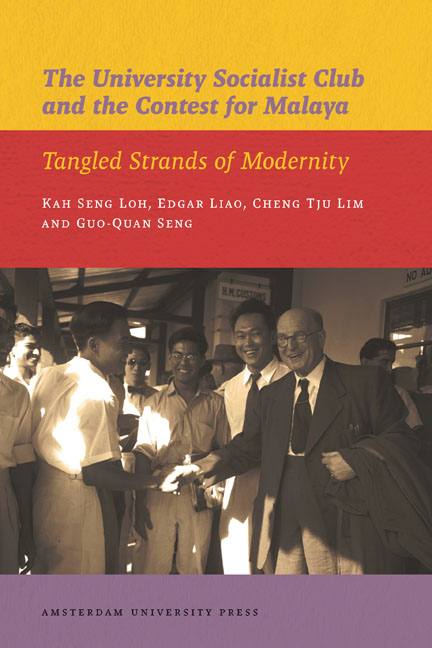Book contents
- Frontmatter
- Dedication
- Contents
- Acknowledgments
- List of Photographs
- Abbreviations
- 1 The Socialist Club and the Modernity Project
- 2 Awake in the Bowl of Night
- 3 The Fajar Trial
- 4 Visionary of the Nation, Voice of Stifled Malayans
- 5 A Beacon of Light on the Campus and Beyond
- 6 Frankly Partisan in the Struggle for Student Leadership
- 7 The Shadow over the Club
- 8 Resisting Malaysia, Swansong for Malaya
- 9 Long Night after Coldstore
- 10 In Defence of University Autonomy and Student Rights
- 11 Entwined Memories and Myths
- Conclusion: Modernity in Singapore and Malaya Reconsidered
- The University Socialists: Biographical Sketches
- Timeline of Events
- Notes
- Bibliography
- Index
- Publications Series
3 - The Fajar Trial
Published online by Cambridge University Press: 21 January 2021
- Frontmatter
- Dedication
- Contents
- Acknowledgments
- List of Photographs
- Abbreviations
- 1 The Socialist Club and the Modernity Project
- 2 Awake in the Bowl of Night
- 3 The Fajar Trial
- 4 Visionary of the Nation, Voice of Stifled Malayans
- 5 A Beacon of Light on the Campus and Beyond
- 6 Frankly Partisan in the Struggle for Student Leadership
- 7 The Shadow over the Club
- 8 Resisting Malaysia, Swansong for Malaya
- 9 Long Night after Coldstore
- 10 In Defence of University Autonomy and Student Rights
- 11 Entwined Memories and Myths
- Conclusion: Modernity in Singapore and Malaya Reconsidered
- The University Socialists: Biographical Sketches
- Timeline of Events
- Notes
- Bibliography
- Index
- Publications Series
Summary
The Special Branch had no sense of irony when arresting the eight student members of the editorial committee of Fajar (“dawn” in Malay) in the wee hours of the morning of 28 May 1954. The arrests and the trial which ensued were to mark a major turning point in the history of Singapore and Malaya. They invigorated the left-wing movement in Singapore, gave the Club a greater ideological unity and led to the formation of the People's Action Party. At the same time, the collaboration of the Fabian and left-wing socialist groups within the PAP was also a positive step forward for the Malayan Spring experiment, although the trial had resulted in a tactical defeat for the British regime.
“Aggression in Asia” and the “513 Incident”
Earlier in the month, the editorial “Aggression in Asia” had appeared on the front page of the seventh issue of Fajar, dated 10 May 1954. It was co-written by M.K. Rajakumar, Poh Soo Kai and James Puthucheary. The editorial took a critical view of the ongoing Anglo- American military initiative to form the Southeast Asia Treaty Organisation, deploring it as evidence of continuing Western imperialism in the region. It rejected the association of Malaya with the Western states and demanded that the country traverse instead a third, non-aligned path. In conclusion, the authors were adamant that “the people of this country do not identity themselves with the actions of the Colonial government”.
The political significance of the editorial ought to be seen in context. Just three days later, another landmark event in Singapore happened: the “513 Incident”, where 900 Chinese middle school students had clashed with the police over the Registration of National Service Bill. In contravention of the Emergency Regulations, the students had gathered to protest against a colonial legislation designed, they believed, to support an imperialist war against China, their cultural motherland. A member of the Fajar editorial board, but not one of those arrested on 28 May, first-year arts student, Jeyaraj Rajarao, then 21, was among the protesters. On 18 May, the University of Malaya Students’ Union came out in support of the 48 Chinese school students arrested during the protest.
- Type
- Chapter
- Information
- The University Socialist Club and the Contest for MalayaTangled Strands of Modernity, pp. 61 - 80Publisher: Amsterdam University PressPrint publication year: 2012



